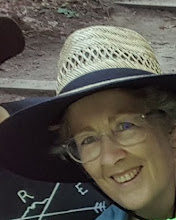Craaaaaaaazy
I hope the video of these crazy fountains comes through. They send pieces of water through the air. Amazing. But (and) not as amazing as the figs wrapped in bacon served during the afternoon reception. All work and no play tomorrow--the reception break this afternoon was really appreciated.
I got to hear Mary Ellen Bates in the Factiva booth. She's written about Free vs Fee information http://www.factiva.com/campaigns/2011/infopro/?from=econtent_bnrad_infopro14nov2011 . The article is titled The True Value of Information: Making the case for value-added aggregators. She offers this article to justify to management the cost of database access and she notes that no one can get unfiltered data from Google any more (she had several friends do the same search from differing IP addresses and they all got different results in Google News). Anyway, she does suggest checking out PLoS. She reiterates everyone else here about tying reference responses to mission values but made some additional good suggestions. She said that during the reference interview we needed to ask how the information will be used and to try to look for ways to add value in mission alignment. She also said that our reference responses needed to be presented in a format that implies value. I think we discussed how at CCL, there was a standard reference format for reference responses, and if they were printed out, they used letterhead. The idea was that the appearance of the report--electronic or paper--reflected the value of the information enclosed--like wearing the right clothes to a job interview. This would be simple enough for us to do and I think really would add value to what we send out, just in terms of readability. Some of our cut and paste-ings are pretty awful to read and look really haphazard.
The final session from today was on Web Scale Discovery, "discovery" being the new, cool term for search. Apparently there are vendors now who are aggregating content that includes both a library's catalog and the content of its databases so that all can be searched from a single search box. Large university libraries are migrating to this search type and some are hiring "ethnographers" to study how faculty and students interact with the search software. Most of this talk was about how to identify a good vendor, test products and what the ethnographer needs to do. Not exactly our cup of tea, but interesting to know its out there and what the promises/pitfalls are. Andrew Asher has created a toolkit for evaluating how to improve a user interface we may want to read at some point that has come out of some of this new interface development.
Off to supper at Lloyd's (on Lower Wacker Drive, of all places ??!!??) with an old school chum from high school and college.





No comments:
Post a Comment